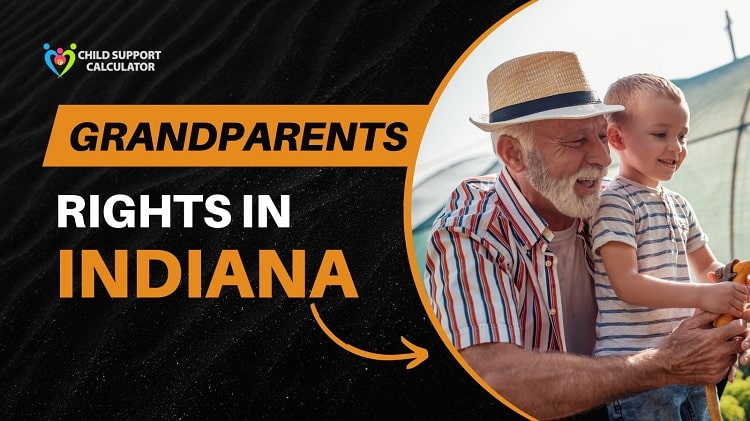Grandparents Rights In Alaska (Updated) 2024
Grandparents usually rejoice when their grandkids are born and wish to be involved in their lives. Grandparents may not have been highly involved in some circumstances, or a child’s parent may seek to limit grandparent visitation.

In some circumstances, parents may divorce, pass away, or relocate. In these cases, grandparents frequently wonder if they have a right to visitation with their grandchildren. The grandparents rights in Alaska are explained in this article.
Grandparent Visitation Rights In Alaska
Because of their distance from their children or employment obligations, many grandparents find that they never get enough time with their grandkids. Some grandparents may find themselves unable to see their grandkids as a result of a divorce or the death of a child.
When it comes to visitation and custody, each state has its own set of rules. Some states are quite tight, allowing grandparents to petition the court for visitation only if the grandchild lives with them. Other state statutes are more expansive, examining what is in the child’s best interests.
Grandparents are able to file a petition for grandparent-child visitation if they meet the following criteria:
- The grandparent has maintained or sought to maintain a personal touch with the child on a regular basis.
- Grandparent visitation is in the best interests of the child.
Grandparents can intervene to request visitation rights if the court makes a custody determination, whether during a divorce or otherwise. If they don’t, they won’t be allowed to request again unless the custodial parent’s or the child’s circumstances have altered to the point where the court should reconsider grandparents rights in Alaska.
Grandparent Visitation When the Child’s Parents Are Married
The majority of married parents are delighted to have their children spend time with their grandparents. However, the married couple does not want a grandparent involved in their child’s life in certain circumstances. In several situations, a grandparent may petition the court for formal visitation with the grandchild.
When parents and grandparents argue regarding grandparent visits, the court usually gives the parents the benefit of the doubt, assuming that they know what is best for the child (unless proven otherwise). The grandparent must demonstrate that the desired visitation is in the kid’s best interests.
The grandparent also bears the responsibility of demonstrating a consistent attempt to form a relationship with the grandchild. For example, a judge advised one grandmother seeking visitation that she needed to produce documentation of contacting her grandchildren, regardless of whether the mother had attempted to link the children and grandma.
The grandmother’s visitation with her grandkids was rejected by the court due to her lack of attempts to contact the grandchildren and a damaged relationship between the mother and grandmother.
Grandparent Visitation With Separated Parents
When parents divorce or formally split, or when one or both parents die, the court may award visitation to a third party, such as a grandmother, if it is in the kid’s best interests. When divorcing parents seek an uncontested divorce, they must settle all problems concerning minor children’s custody, including whether grandparents will be allowed visitation.
If the evidence reveals that the parents agree to allow information access between the kid and the grandparent, the judge may refuse to give formal grandparent visitation. For example, when the divorced parents agreed that the children could see both sets of grandparents during their own custody time, the court rejected adding official visitation for both sets of grandparents to the mix.
When deciding whether or not to allow grandparent visitation, the court will consider whether the grandparent’s son or daughter, who is the grandchild’s parent, has a history of child abuse or domestic violence. If the grandparent’s child’s parent is abusive, the court may limit the grandparent’s visitation to ensure that the youngster is not harmed.
When a judge is considering a custody or visitation decision, the judge can appoint a guardian ad litem to represent the child’s interests, such as when a grandparent requests visitation. The court may assign the guardian’s costs to the grandparent if necessary.
When a court removes a parent’s parental rights, it also removes the child’s ties with that parent’s relatives. Grandparents who have lost parental rights to their grandchildren are unable to petition the court for visitation.
Visitation Rights After Adoption
When a kid is adopted by a non-relative, the legal tie between the adopted child and his or her natural parents is severed, as is the legal relationship between the adopted child and all other natural relatives. Natural parents may still have visitation with their adopted child if the adoptive parents and natural parents agree.
Similarly, the adoptive parents may structure the adoption so that the adopted child can visit his or her natural grandparents; this decision is normally made at the time of the adoption. Unless the adoption decree clearly indicates that an adopted child’s inheritance rights will be continued, an adopted child cannot inherit from his or her natural parents or grandparents.
If the adoptive parents are the child’s relatives, the court may nevertheless allow grandparents visits if it is in the child’s best interests. Grandparents’ visiting rights are not automatic since Alaska courts have refused visits to grandparents who are incompetent to care for a child or who allow the grandchild to be exposed to an unfit parent.
Can Grandparents Win Custody of a Grandchild?
A grandparent may be granted primary custody of a grandchild in some instances. In a custody judgement, judges will only favour a non-parent, such as a grandmother, over a parent if the parent is unfit or otherwise unable to care for the child. The court may transfer custody to a grandmother if a child’s parent or parents are unfit to have custody, have died, or have abandoned the child under grandparents rights in Alaska.
In one case, the Department of Health and Social Services requested the court to strip an alcoholic father of his parental rights after he had abandoned his child for three years. According to a therapist, the youngster had built close relationships with the maternal grandparents, and the judge granted those grandparents primary custody of the child.
Faqs
There is no explicit statute in Alaska that covers a grandparent’s right to seek custody of a grandchild. In Alaska Supreme Court cases, it has been established that a parent has priority over non-parents in custody decisions.
Grandparents may petition for grandparent-child visitation if the grandparent has created or sought to establish continuing personal contact with the kid, and grandparent visitation is in the child’s best interests.
Grandparents do not have automatic rights to see their grandchildren under the law. Parents can opt to keep their children away from grandparents in almost every scenario. This isn’t to say that grandparents don’t have other options.
Grandparents do not have an automatic right to see their grandchildren under existing family law. The parents would have to approve any interaction the children have with their grandkids.
In cases where parents are unable to care for their children, grandparents may be granted custody of their grandkids. Grandparents can accomplish this by getting temporary or permanent custody, commonly referred to as special or legal guardianship.







